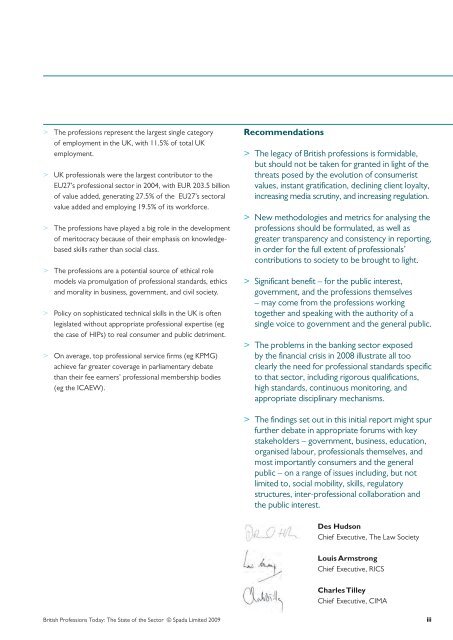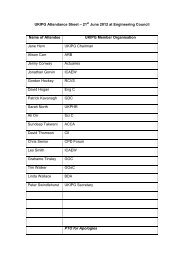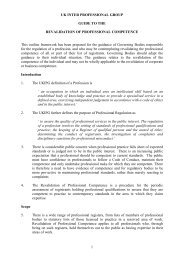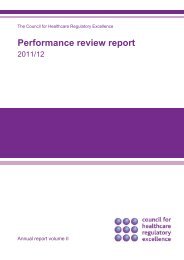BRITISH PROFESSIONS TODAY: THE STATE OF ... - Property Week
BRITISH PROFESSIONS TODAY: THE STATE OF ... - Property Week
BRITISH PROFESSIONS TODAY: THE STATE OF ... - Property Week
You also want an ePaper? Increase the reach of your titles
YUMPU automatically turns print PDFs into web optimized ePapers that Google loves.
><br />
><br />
><br />
><br />
><br />
The professions represent the largest single category<br />
of employment in the UK, with 11.5% of total UK<br />
employment.<br />
UK professionals were the largest contributor to the<br />
EU27’s professional sector in 2004, with EUR 203.5 billion<br />
of value added, generating 27.5% of the EU27’s sectoral<br />
value added and employing 19.5% of its workforce.<br />
The professions have played a big role in the development<br />
of meritocracy because of their emphasis on knowledgebased<br />
skills rather than social class.<br />
The professions are a potential source of ethical role<br />
models via promulgation of professional standards, ethics<br />
and morality in business, government, and civil society.<br />
Policy on sophisticated technical skills in the UK is often<br />
legislated without appropriate professional expertise (eg<br />
the case of HIPs) to real consumer and public detriment.<br />
On average, top professional service firms (eg KPMG)<br />
achieve far greater coverage in parliamentary debate<br />
than their fee earners’ professional membership bodies<br />
(eg the ICAEW).<br />
Recommendations<br />
> The legacy of British professions is formidable,<br />
but should not be taken for granted in light of the<br />
threats posed by the evolution of consumerist<br />
values, instant gratification, declining client loyalty,<br />
increasing media scrutiny, and increasing regulation.<br />
> New methodologies and metrics for analysing the<br />
professions should be formulated, as well as<br />
greater transparency and consistency in reporting,<br />
in order for the full extent of professionals’<br />
contributions to society to be brought to light.<br />
> Significant benefit – for the public interest,<br />
government, and the professions themselves<br />
– may come from the professions working<br />
together and speaking with the authority of a<br />
single voice to government and the general public.<br />
> The problems in the banking sector exposed<br />
by the financial crisis in 2008 illustrate all too<br />
clearly the need for professional standards specific<br />
to that sector, including rigorous qualifications,<br />
high standards, continuous monitoring, and<br />
appropriate disciplinary mechanisms.<br />
><br />
The findings set out in this initial report might spur<br />
further debate in appropriate forums with key<br />
stakeholders – government, business, education,<br />
organised labour, professionals themselves, and<br />
most importantly consumers and the general<br />
public – on a range of issues including, but not<br />
limited to, social mobility, skills, regulatory<br />
structures, inter-professional collaboration and<br />
the public interest.<br />
Des Hudson<br />
Chief Executive, The Law Society<br />
Louis Armstrong<br />
Chief Executive, RICS<br />
Charles Tilley<br />
Chief Executive, CIMA<br />
British Professions Today: The State of the Sector © Spada Limited 2009<br />
iii










